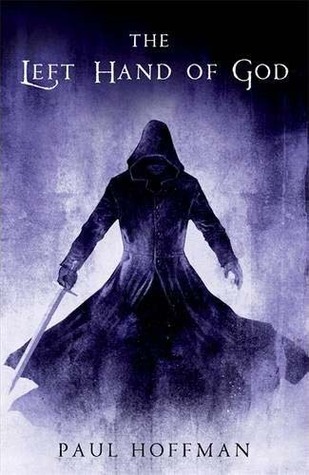
The Left Hand of God is a dark fantasy novel and happens to be the first novel I read in the genre, having read it several years ago. The novel is the first in a trilogy of the same name by Paul Hoffman. The novel is set in a world where a religious group known as the Redeemers rule the land. The Redeemers are a twisted, extreme religion with many obvious parallels to Christianity, such as a belief in a Hanged Redeemer who functions as a parallel to Jesus. The setting is highly implied to be a post apocalyptic earth but nothing is explicitly stated. The Redeemers are constantly at war with their enemies, who are referred to as the Antagonists. The plot follows Thomas Cale, a fourteen year old boy serving with the Redeemers, who is forced to flee the Redeemers after discovering secrets within the organisation. Unbeknownst to him, he is actually believed to be an important figure within their belief system and the Redeemers want him back. Thomas Cale establishes himself in the Matterazzi town of Memphis and begins to fall in love with Arbell Swan-Neck, the Matterazzi princess but things are not set to last as the Redeemers close in on Thomas Cale and his friends.
The first thing that struck me was the worldbuilding. The world was very much unique. As previously mentioned, it is highly implied through the cultural similarities that the work is in fact set in a post apocalyptic earth, and since magic is treated in a very ambiguous manner it may well be the case. The ambiguity of the setting was somewhat confusing on my first read through but it upon reflection it provided a lot for the story. I did feel like the parallels between the Redeemers and Christianity were a bit blatant, and at times I found myself wondering if the author was trying to use the novel to comment on the hypocrisies within the church, both historically and in the present. I tend not to be fond of works which have strong ideological themes, even if I agree with the point they’re trying to make, and as a result the possible ideological bias served against it. Yet the ideological bias didn’t work against it to the extent which I thought it would, and I found the parallels between real world Christianity and the Redeemers to be interesting.
I was also quite fond of the characters. Thomas Cale, the main character, is shown to have a wit and brutal sarcasm common to many dark fantasy protagonists, and since this was the first story I had read in the genre I thoroughly enjoyed him on my first read through and still enjoy him to this day. His friends are a bit bland as characters but still have a dark wit about them which managed to just barely endear them, though not the extend as Thomas Cale did. Cale’s love interest, Arbell seemed an all right character at first but then in a huge twist she turned out to be self centred and willing to turn on Thomas when things go south. As the central female character in the novel it irked me that she was portrayed in the narrative in such a manner, even if most of that comes from Thomas’ biased personal point of view. I wish that they had done more to show her in a more sympathetic light.
In terms of plot I felt like the overall plot was lacking somewhat, with the pace slowing down around the middle of the novel. The twist at the climax, namely Thomas being betrayed and handed over for the Redeemers seemed abrupt and disappointing. The ending was blatant sequel pandering, which is something I tend to hate in fantasy, especially since in this case the climax leading up to it was cut short thanks to the twist. The conflict in the middle didn’t seem that clear either, and seemed to have no purpose in the overall narrative. As a whole I felt like the whole story could be summarised as Thomas Cale leaves the Redeemers, lives a happy life in Memphis then gets betrayed and handed over to the Redeemers ready to be their chosen one. The reveal of being the chosen one also came rather late in the story and thus seemed like an abrupt ass pull to create more conflict for Thomas in the sequel.
Overall the novel was somewhat decent, with an entertaining narrative. Yet I felt like the world could have been fleshed out a bit more. The plot also needed a lot of work, not just in pacing but also in the way the story was handled as a whole. That being said, the novel gripped me just enough to get me reading the other two novels in the series and made me hopeful for the dark fantasy genre as a whole. At the time I read it I had fonder opinions of the novel but those opinions have changed with time, and as a result I’d probably say it was a fairly average read.
SCORE: 4/5
IN A WORD: OKAY
I read this a few years ago to, I quite enjoyed it, enough to buy the sequel which I found to be poor then I had to finish the trilogy which I wish I hadn’t bothered with as I thought the third book was terrible.
LikeLike
That isn’t too different from my opinion. I mostly completed it because I have trouble leaving a series unfinished.
LikeLiked by 1 person
In contrast I found all of the books both gripping and original The books are full of dark humour directed at the absurd hypocrisy and nonsense of religious beliefs. I have rarely read such an accurate assessment of how blind people are to the obvious when it comes to the nonsense of religion
LikeLike